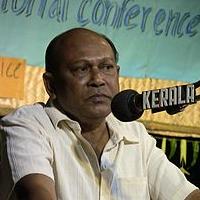
Interview with Siritunga Jayasuriya, Sri Lankan socialist leader
Siritunga Jayasuriya is the leader of our sister party in Sri Lanka, the United Socialist Party. He is also the President of the Samastha Lanka Free Trade Union and has been active in the labour movement for over 40 years. Siritunga is well known in Sri Lanka for his opposition to the government’s war against the Tamil people.
The Socialist Party’s Mel Gregson recently spoke to Siritunga about the situation in Sri Lanka and why people continue to seek asylum in Australia.
MG: What is the situation facing Tamil people in Sri Lanka now that the civil war has ended?
SJ: Outside of Sri Lanka, countries like Australia, have created the idea that Sri Lanka is safe now after the war. This is not true at all. Now, two and a half years after the war the army still occupies the north of the country and controls every aspect of human life. Everything has to go through the army commander. In Jaffna, people still fear for their life. There are many people who are trying to leave Sri Lanka because of these reasons.
Even a Government official in Sri Lanka recently said that every other day a Tamil woman is either raped or sexually assaulted. People are routinely attacked. What the Tamil people say that they want more than anything is democracy and freedom. They still do not have this. So how can one say Sri Lanka is ok after the war?
At the same time you have to recognise that the Australian Government was a part of the war. They helped the Sri Lankan Government execute the war and they continue to work together.
MG: Is the situation improving?
SJ: Although the Sri Lankan Government promised to build something like 100,000 houses for those displaced by the war, not even 10,000 houses have been built. This is because the so-called ‘resettlement’ is happening according to the military plan.
One of the things they are doing is refusing to allow people back to the areas they lived before the war. People are being moved to completely different areas. For example, one of the fishing communities was asked to go to the jungle area. This is an attempt to completely destroy their way of life.
In Jaffna, in every family at least one person, but more likely two or three or four people, have been killed. So they have gone through a very difficult period, and now what is the Government doing? They are not killing them with bullets going through their chest, but they a finding another way. For example, the Government is renaming the roads with Sinhala names, on every street corner they are putting up Buddhist statues, everywhere they are planting Bodhi trees (a Buddhist symbol), and they are building Buddhist temples. This is in an area where there hardly any Sinhala Buddhist people live!
Why are they doing this? It is part of the psychological repression of the Tamil people. In this way the Government has not acknowledged the Tamil national question at all.
MG: What kind of solutions do you think are necessary to resolve the problems facing Tamil people in Sri Lanka?
SJ: The national question has a long history in Sri Lanka since independence from Britain in 1948. Many agreements have been reached between Tamil politicians and Sinhala politicians, but none of these agreements were ever really put into practice.
For example, the 13th amendment of Sri Lankan Constitution came after the 1987 accord. It gives police power and control of the land to elected provincial governments. But still, even though it’s part of the Sri Lankan constitution, President Rajapakse is not prepared to put it into practice. These things have been completely denied.
So, generally, Tamil people think they have been fooled again and again. This is the reason it came to a war.
It is very clear that the Sinhala Buddist dominated capitalist state leadership is not prepared to settle the national question. Every leader, one after another, plays the same game.
So, after 30 years of brutal war the time has come for Tamil and Sinhala people to join together to fight. The United Socialist Party thinks the oppressed Tamil people, together with the Muslim people who live in the eastern part of the country, have to join with the oppressed working class, poor and youth in the south.
The army has increased its presence all around the country, even in Sinhala areas. In this year’s annual budget, the Government has allocated 230 billion rupees to defence, even after the war! The allocation for education is only 57 billion rupess, and health is only 63 billion rupees.
Because of the war the working class has been divided. Now, the working class is beginning to start to move as a class, because they have realised that day by day they are losing the things that they have won in the past. Because of this I think the time is coming again when the working class will take independent action to win their demands and solve the problems facing Sri Lankan people.

Be the first to comment